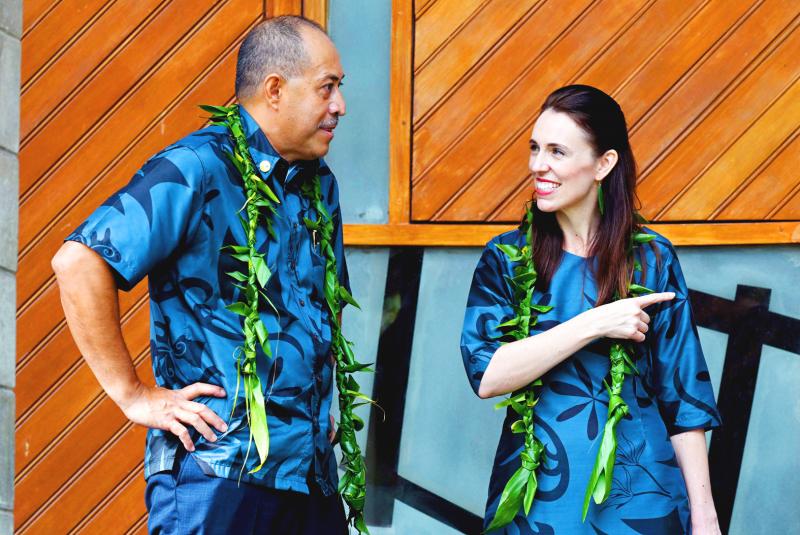New Zealand is to continue to cooperate on “shared interests” with China, even as tensions increase in the region and China grows “more assertive in the pursuit of its interests,” New Zealand Prime Minister Jacinda Ardern said yesterday.
Speaking at the China Business Summit in Auckland, New Zealand, the prime minister said she was planning a trip to China “to seize new opportunities for dialogue,” support the trade relationship and further cooperate on the climate crisis.
“Even as China becomes more assertive in the pursuit of its interests, there are still shared interests on which we can and should cooperate,” she said.

Photo: AFP
Ardern’s speech comes during a tense period for the Indo-Pacific region, with Western allies concerned about China’s push for influence, particularly its proposed regional Pacific security deal.
Ardern called for Beijing to respect and support the institutions that she said undergird regional and international peace and stability.
New Zealand and China had been “major beneficiaries of relative peace, stability and prosperity... The rules, norms and institutions, such as the United Nations, that underlie that stability and prosperity remain indispensable,” but are also “under threat,” Ardern said.
“We see how much we have to lose should the international rules-based system falter,” she said.
The speech was closely wedded to the party line of Ardern’s second-term government’s foreign policy.
The policy has emphasized “respect, consistency and predictability” in dealings with China: essentially, that the government would continue to cooperate and work closely with China on mutually beneficial matters, particularly trade, while calling out differences — typically on foreign policy and human rights.
That balancing act has, at times, been a difficult one to manage.
New Zealand remains highly dependent on China for trade — the nation is its largest trading partner, accounting for 23 percent of total trade and 32 percent of goods exports — but as China’s economic importance to New Zealand has grown, ideological differences with Beijing have become increasingly stark, with reports of human rights abuses in Xinjiang, Beijing’s push into the Pacific and South China Sea, and the erosion of democracy in Hong Kong.
“In response to increasing tensions or risks in the region — be they in the Pacific, the South China Sea or the Taiwan Strait — New Zealand’s position remains consistent. We call for adherence to international rules and norms; for diplomacy, de-escalation and dialogue rather than threats, force and coercion,” Ardern said. “Our differences need not define us, but we cannot ignore them. This will mean continuing to speak out on some issues — sometimes with others and sometimes alone.”
“We have done this recently on issues in the Pacific. We also have consistently expressed our concerns about economic coercion, human rights, Xinjiang and Hong Kong,” she said.
One of the prime minister’s primary examples of faltering institutions and norms was Russian President Vladimir Putin’s invasion of Ukraine, and she called on China “to be clear that it does not support the Russian invasion” and “to use its access and influence to help bring an end to the conflict.”

DAREDEVIL: Honnold said it had always been a dream of his to climb Taipei 101, while a Netflix producer said the skyscraper was ‘a real icon of this country’ US climber Alex Honnold yesterday took on Taiwan’s tallest building, becoming the first person to scale Taipei 101 without a rope, harness or safety net. Hundreds of spectators gathered at the base of the 101-story skyscraper to watch Honnold, 40, embark on his daredevil feat, which was also broadcast live on Netflix. Dressed in a red T-shirt and yellow custom-made climbing shoes, Honnold swiftly moved up the southeast face of the glass and steel building. At one point, he stepped onto a platform midway up to wave down at fans and onlookers who were taking photos. People watching from inside

MAKING WAVES: China’s maritime militia could become a nontraditional threat in war, clogging up shipping lanes to prevent US or Japanese intervention, a report said About 1,900 Chinese ships flying flags of convenience and fishing vessels that participated in China’s military exercises around Taiwan last month and in January last year have been listed for monitoring, Coast Guard Administration (CGA) Deputy Director-General Hsieh Ching-chin (謝慶欽) said yesterday. Following amendments to the Commercial Port Act (商港法) and the Law of Ships (船舶法) last month, the CGA can designate possible berthing areas or deny ports of call for vessels suspected of loitering around areas where undersea cables can be accessed, Oceans Affairs Council Minister Kuan Bi-ling (管碧玲) said. The list of suspected ships, originally 300, had risen to about

A Vietnamese migrant worker yesterday won NT$12 million (US$379,627) on a Lunar New Year scratch card in Kaohsiung as part of Taiwan Lottery Co’s (台灣彩券) “NT$12 Million Grand Fortune” (1200萬大吉利) game. The man was the first top-prize winner of the new game launched on Jan. 6 to mark the Lunar New Year. Three Vietnamese migrant workers visited a Taiwan Lottery shop on Xinyue Street in Kaohsiung’s Gangshan District (崗山), a store representative said. The player bought multiple tickets and, after winning nothing, held the final lottery ticket in one hand and rubbed the store’s statue of the Maitreya Buddha’s belly with the other,

Japan’s strategic alliance with the US would collapse if Tokyo were to turn away from a conflict in Taiwan, Japanese Prime Minister Sanae Takaichi said yesterday, but distanced herself from previous comments that suggested a possible military response in such an event. Takaichi expressed her latest views on a nationally broadcast TV program late on Monday, where an opposition party leader criticized her for igniting tensions with China with the earlier remarks. Ties between Japan and China have sunk to the worst level in years after Takaichi said in November that a hypothetical Chinese attack on Taiwan could bring about a Japanese